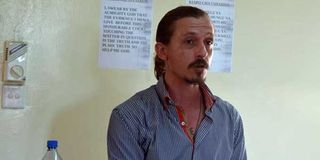A dead tycoon, furious sons and a body in mortuary for seven years
Ms Alexandra Veevers gives her testimony at Mombasa Law Courts on May 3, 2017 during an inquest into the death of her father Harry Roy Veevers.
On Valentine’s Day in 2013, British tycoon Harry Roy Veevers breathed his last in his bed at his palatial home in Nyali, Mombasa.
He was then hurriedly buried without a postmortem being conducted to ascertain what killed him. He was buried as a Muslim and in a Muslim cemetery.
His second wife, Azra Parveen Din, who lived with him at the time, explained that her husband had died of a natural cause.
But his hurried burial and as a Muslim irked his two sons, Richard Veevers and Philip Veevers, who were at the time in the United Kingdom.
The two suspected foul play and to clear the air, they approached a court and obtained an exhumation order. Their father’s body was exhumed for a postmortem and toxicology tests to establish what killed him.
What followed was a protracted judicial inquest involving his two squabbling families.
On Friday, a lawyer representing one of the families told Mombasa Chief Magistrate Martha Mutuku that the tycoon’s body is still preserved in a morgue about seven years after it was exhumed.
“You mean the body is still in the mortuary seven years on?” the magistrate asked the lawyer, who responded in the affirmative.
He told the court that a witness who had been dodging the court, prompting a warrant of arrest to be issued against them, had been found and will be available to testify so that the matter could be concluded.
“We only have two or one witness remaining. We have heard that the witness has committed to come and testify,” the lawyer said.
The case has dragged on in the court for about nine years. At least three different magistrates have handled it and were transferred to other stations before concluding the proceedings.
An autopsy on the tycoon’s body indicated that the soil around it had traces of a killer pesticide.
But the tycoon’s death is still a mystery as pathologists who testified in the case disagreed sharply on the autopsy results.
While former government pathologist Dr Moses Njue told the inquest that there was scientific evidence to show that the Briton was poisoned, another declared that the cause of death was unknown.
The postmortem was conducted by three Kenyan pathologists, including Dr Njue, who said he had established that there was poison in the soil around Roy's stomach in the grave.
British forensic expert
British forensic expert Dr Richard Alexander Allan, in his report, discounted the likelihood of poisoning. In his analysis, he said he found no traces of cyhalothrin pesticide in the samples he tested.
But he said it was possible the poison might have deteriorated in storage because he received the samples after nine months. The samples taken to him for toxicology tests included soil and tissues collected from Roy Veevers’ grave.
Dr Allan was hired by Ms Azra's children.

Richard John Veevers, the eldest son of British tycoon Harry Roy Veevers, who died mysteriously in Mombasa in 2013, testifies at an inquest to determine the cause of death at the Shanzu Law Courts in Mombasa on October 22, 2015. He told the inquest that post-mortem results showed his father died of cyanide poisoning.
Declaring Dr Allan’s findings scientifically improbable and questionable, Dr Njue insisted the tycoon was killed by a highly poisonous pesticide.
Dr Njue’s opinion was also dismissed by Dr Andrew Gachii, who was also hired by Ms Azra. Dr Gachii described Dr Njue’s findings and conclusions as unrealistic and incorrect.
Two years ago, Roy Veevers’ daughter, Ms Alexandra Veevers, pleaded with the court to allow her to bury her father’s remains, which she claimed were kept in a body bag at the Coast General Hospital mortuary after they were exhumed for an autopsy.
“My wish is to put the body back [into the grave],” Ms Veevers told Mombasa Senior Principal Magistrate Charles Ndegwa during the inquest.
Ms Veevers lamented that her father’s remains were not safe at the morgue and she wanted them interred.
Throughout the inquest, Ms Azra’s children, Alexandria and Hellen Veevers, and their half-brothers have engaged in a blame game on who is responsible for the tycoon’s death.
Richard Veevers and Philip Veevers have accused Ms Azra and her children of killing their father over his vast property spread across Mombasa.
They also alleged that their father was killed because he had wanted to marry another woman.

Former Chief Government Pathologist Dr Moses Njue testifies before the Mombasa Law Courts in an inquest of British tycoon Harry Roy Veevers who died mysteriously in 2013.
But Ms Azra and her children maintained that Roy Veevers died of a heart attack or suicide.
To support their claim, they presented to the inquest his medical records covering the seven years before he died.
The records alleged that he started harbouring suicidal thoughts after suffering several problems, including erectile dysfunction.
On Friday, Magistrate Mutuku said she was new to the case and would discuss it with Magistrate Ndegwa, who was transferred to another station, before issuing further directions.
The case will be mentioned on December 5.





